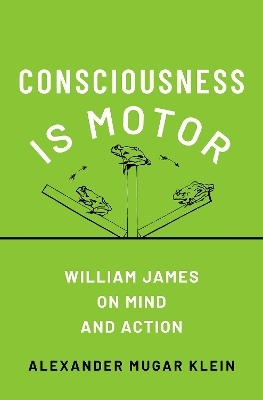
Consciousness is Motor
Oxford University Press Inc (Verlag)
978-0-19-008584-1 (ISBN)
- Noch nicht erschienen (ca. März 2025)
- Versandkostenfrei innerhalb Deutschlands
- Auch auf Rechnung
- Verfügbarkeit in der Filiale vor Ort prüfen
- Artikel merken
James's early work on consciousness engaged the 1870s automatism controversy. The controversy was triggered, Klein argues, by experiments demonstrating that living, decapitated frogs are capable of goal-directed action. One side regarded goal-directedness as evidence of spinal consciousness; the other espoused epiphenomenalism, reasoning that consciousness must play no role in producing even purposive action since the latter is possible for brainless creatures.
James intervened, Klein shows, by arguing that consciousness has a likely evolutionary function-behavior regulation-and so cannot be a mere epiphenomenon. It accomplishes this function by affording a capacity for evaluation, on Klein's reading. As evidence, James appealed not just to introspection, but also to experimental facts, such as that hemisphere-less vertebrates have a diminished capacity for evaluating different available means to pursue goals. James's "ideo-motor" model of action demonstrated precisely how an evaluating consciousness could help regulate behavior. Klein excavates key clinical observations James designed the ideo-motor model to accommodate, including observations of patients with impairments like paresis and anaesthesia. The resulting model features an early example of a predictive, error-correction feedback loop for motor control.
Klein concludes by showing how James's models of consciousness and action feed into his distinctive philosophical outlook, soon to be known as pragmatism. According to his doctrine, meaning and truth are understood in terms of goal-directed action guidance. Consciousness Is Motor paints a striking new portrait of James as an empirically-informed philosopher and psychologist-one who anticipated some contemporary approaches, even while furnishing neglected alternatives to theoretical problems that continue to vex researchers today.
Alexander Klein is Canada Research Chair and Associate Professor of Philosophy at McMaster University. He has held postdocs and fellowships at Cornell University, the University of Toronto, and the University of Sheffield, and his work has been supported by the Fulbright Foundation and the Andrew Mellon Foundation. Journals in which his essays appear include Philosopher's Imprint, Journal of the History of Philosophy, and Philosophy of Science, and he is also the editor of the Oxford Handbook of William James.
Primary Source List
Acknowledgements
Preface
Part 1 Preliminaries
Chapter 1 Introduction: Warp and Weft in William James
Chapter 2 Biographical & Historical Preliminaries
Chapter 3 James's Methodology
Part 2 Automatism, Vitalism, Mechanism
Chapter 4 Descartes
Chapter 5 Pflüger and Lewes
Chapter 6 Huxley
Part 3 James on the Evolutionary-Physiology of Consciousness
Chapter 7 Consciousness
Chapter 8 Against Epiphenomenalism
Part 4 James on the Evolutionary-Physiology of Action and Will
Chapter 9 Action
Chapter 10 Will
Postscript Towards Pragmatism
Bibliography
Index
| Erscheint lt. Verlag | 28.3.2025 |
|---|---|
| Zusatzinfo | 14 |
| Verlagsort | New York |
| Sprache | englisch |
| Maße | 156 x 235 mm |
| Themenwelt | Geisteswissenschaften ► Philosophie |
| Naturwissenschaften | |
| Sozialwissenschaften | |
| ISBN-10 | 0-19-008584-3 / 0190085843 |
| ISBN-13 | 978-0-19-008584-1 / 9780190085841 |
| Zustand | Neuware |
| Informationen gemäß Produktsicherheitsverordnung (GPSR) | |
| Haben Sie eine Frage zum Produkt? |
aus dem Bereich


